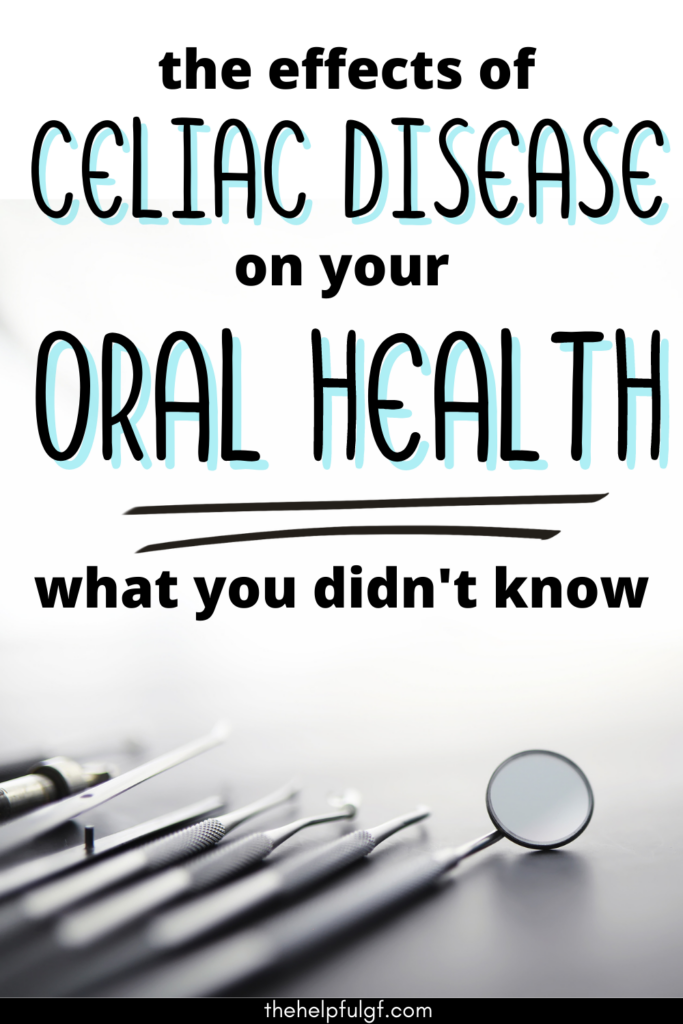Did you know there can be effects of celiac disease on teeth, and gums? This autoimmune condition, usually connected to symptoms like diarrhea and abdominal pain, can also affect oral health.
It’s a little-known fact, but your teeth and gums can show signs of celiac disease even before you notice other symptoms. Unfortunately, these oral problems can prevail even after you have changed your diet and adopted a gluten-free eating habit.
Join us as we go through the effects of celiac disease on the teeth and gums and what you can do to safeguard your oral health.
Keep reading to learn more about the effects of celiac disease on teeth and gums or use the table of contents below to jump to the section of your choice.
Are you new here? Here's tips to live gluten-free without the stress!
- How to eat out SAFELY when you’re gluten-free
- How to make ANY recipe gluten-free
- How to TRAVEL gluten-free and still have fun
…get valuable support in my EXCLUSIVE Facebook community “Stress-Free Gluten-Free” by clicking here!
The gluten-free guide below is based on personal experience and research. Always be sure to discuss any medical changes with your doctor for your personal medical needs. Additionally, this post contains affiliate links. As an Amazon Associate I earn from qualifying purchases. My full disclosure isn’t that interesting, but you can find it here.
Take this quick quiz and uncover the secrets to making your gluten-free lifestyle not just manageable, but truly enjoyable with custom recipes and tips!

What Is Celiac Disease? A Quick Look
Celiac disease is when the body cannot tolerate gluten, a protein found in wheat, barley, and rye. Not to be confused with gluten intolerance, which causes symptoms upon ingestion but doesn’t cause long-term harm to your body.
When a person with celiac disease consumes gluten, their immune system reacts like a dangerous invader, attacking the small intestine and causing damage. This damage makes it difficult for the body to absorb nutrients from food, leading to various digestive symptoms.
According to NatruSmile approximately 1 in 133 Americans, or roughly 1% of the population, live with this autoimmune disorder. However, recent screening studies have suggested that the prevalence of celiac disease in the United States may be even higher than previously thought, indicating a potentially more significant impact on individuals and the healthcare system.
5 Ways Celiac Disease Affects Oral Health
As a severe autoimmune condition, celiac disease affects both children and adults. The ruthless health peril can cause substantial damage to oral health, from dry mouth to cavities and so on. Let’s closely examine five of celiac's most common effects on our oral health.

Effects on Children's Teeth
Children with celiac disease may have enamel defects, such as grooves and ridges on the teeth, or patchy or discolored teeth. These enamel defects occur because celiac disease can prevent the body from properly absorbing nutrients like calcium and phosphorus, which are essential for healthy teeth. In some cases, teeth may be sensitive or more prone to cavities.
Children with enamel defects may benefit from fluoride treatment, sealants, and good oral hygiene, and it won’t hurt to follow a gluten-free diet rich in plant-based superfoods.
Fluoride treatment can help strengthen the enamel, making teeth less prone to cavities. Sealants are protective coatings that can be applied to teeth to protect them from decay. Good oral hygiene, such as brushing and flossing regularly, can help prevent cavities and further damage to the teeth.
Celiac Disease and Enamel Defects
Researchers aren't sure exactly how celiac disease causes enamel defects. One possibility is that the damage to the small intestine caused by celiac disease indirectly affects the teeth. Another possibility is that the immune system of people with celiac disease directly damages the developing teeth.
This second hypothesis is supported by the fact that dental enamel defects are sometimes found in close relatives of people with celiac disease who have not been diagnosed with the condition themselves. That suggests that there may be a genetic component to these enamel defects.
Celiac Disease and Cavities
If you had undiagnosed celiac disease as a child, your teeth might have been damaged in a way that leads to cavities as an adult. That's because damage from celiac disease can cause enamel defects, which weaken your teeth. Researchers think these enamel defects can appear before other celiac disease symptoms develop.
Additionally, vitamin D and calcium deficiencies, common in celiac disease, may increase the risk of cavities. You can take a proactive approach and try different gluten-free yogurt products to compensate for possible calcium deficiencies.
Celiac Disease and Dry Mouth
A dry mouth is a common complaint among people with celiac disease. That's because celiac disease is associated with an autoimmune condition called Sjögren's syndrome, which attacks the glands responsible for producing saliva. As a result, Sjögren's syndrome can cause severe dry mouth.
A dry mouth increases the risk of tooth decay and loss because saliva is crucial for washing away the bacteria that cause cavities. The syndrome also affects the moisture levels in the eyes, causing severe dryness, redness, and impaired vision.
Celiac Disease and Canker Sores
Medically known as aphthous ulcers, canker sores (mouth sores) are extremely painful, open sores in the mouth. These ulcers can be white or yellow with a reddish outline. Canker sores are not cancerogenic, though, even though they look frightening.
These white sores are common and can appear inside the lips, gums, or tongue. The reasons leading to these abnormalities are manyfold, and one of them is celiac disease.
Even though these canker sores usually occur after innocently biting your lip or cheek or having sustained a mouth injury, it isn’t clear how celiac disease would render such a consequence. However, deficiencies like iron, vitamin B12, and folate deficiency are possible, linked to developing celiac disease and experiencing canker sores more abundantly.
Wrapping Up: The Impact of Celiac Disease on Oral Health
A persistent health condition can be exhausting and unnerving, even more, so if children are affected. Celiac disease is one health condition that manifests in both children and adults.
By affecting a person’s immune system, celiac disease also affects oral health. From decaying teeth to mouth sores and cavities, celiac disease causes a series of oral irregularities that patients, and sometimes even dentists, aren’t fully aware of.
Celiac disease can profoundly impact oral health, from causing enamel defects to contributing to dry mouth and tooth decay. If you think you may have celiac disease, you should see your doctor for a diagnosis. In the meantime, taking care of your teeth by brushing regularly, flossing, and using mouthwash is important.
Don't forget to schedule regular visits to your dentist for cleanings and checkups.
FAQs
Can celiac disease affect your teeth?
Yes, celiac disease can result in symptoms such as dry mouth, cavities, canker sores, and enamel defects in the teeth. In fact, oral health can provide valuable insights into celiac disease.
Can celiac disease lead to brown spots on teeth?
Absolutely. Celiac disease can render a tooth discolored, from turning yellow and brown, and even cause the teeth to appear translucent.
Can celiac disease cause gum recession?
According to dental experts, yes, celiac disease can cause problems with the gums, including recession of the gum area. Even though it might not happen overnight, the gums can recede if specific measures aren’t adopted. For instance, regular teeth cleaning (brushing and flossing), following a gluten-free diet, and avoiding enamel-corroding foods and drinks can help ease celiac symptoms.
Can celiac disease affect your gums?
People unable to process gluten frequently suffer from periodontal diseases and experience inflamed, red, swollen, and painful gums.
Should I tell my dentist I have celiac disease?
You should definitely inform your dentist of your suffering from celiac disease. Doing so enables them to tailor dental procedures to your health condition and offer the most effective treatment.
What toothpaste is good for celiac disease?
When picking out toothpaste, make sure you pay attention to the ingredients and choose one without gluten in any type or form. Luckily, there are a lot of reputable brands employing gluten-free formulas.
More articles related to healthy living with celiac disease you'll love:
- Easy Gluten Free Substitutes and Ingredient Swaps
- Yoga Poses for Chronic Illness
- Best Gluten Free & Dairy Free Cookbooks
What's they key to loving your gluten free life? Get your personalized plan with the guide you need to thrive!






Leave a Reply